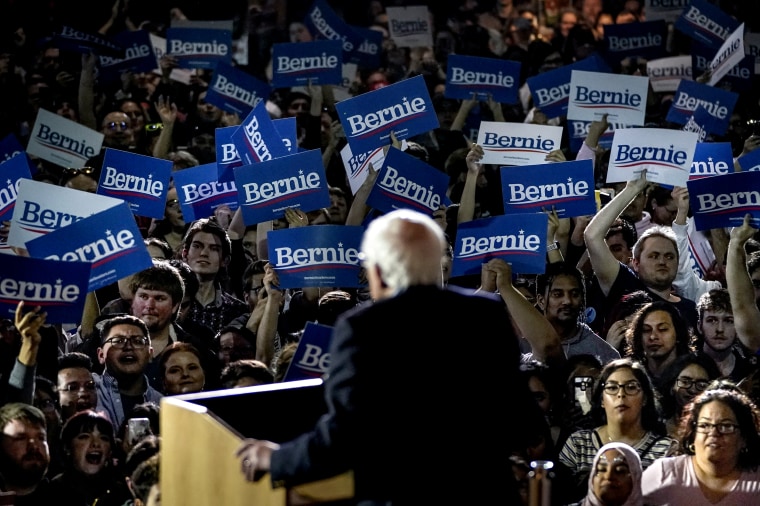Sen. Bernie Sanders (I-Vt.) won the Iowa caucuses and the New Hampshire primary, but both victories were by narrower-than-expected margins. Would we see the Vermont senator win any of the early nominating contests in a landslide?
Sanders ... rode a wave of support from young voters, liberal voters and Latinos to a runaway first-place finish in Saturday's contest -- strengthening his status as the front-runner.
Vote tallies out of Nevada are still coming in, but with the count nearly complete, there's no doubt that the independent senator has gone three-for-three in the 2020 nominating contests, and Sanders appears very well positioned to win the Democratic nomination.
As the political world's focus shifts to South Carolina's primary -- which is now just five days away -- let's take stock of where things stand for each candidate. In the order in which they appear to have finished in Nevada:
For Bernie Sanders, the good news is he's in a commanding position and should be seen as the likely Democratic nominee. Indeed, with the rest of the field splintered several ways, it's getting increasingly difficult to see who could catch him. The bad news is he has a target on his back, which means each of the remaining candidates will likely turn their fire on Sanders directly for the first time. (This started in earnest over the weekend.) It's also worth noting that entrance polls found Sanders winning 30% of the Democratic vote in Nevada, which didn't stand in the way of an easy win, but which suggests the Vermonter still has some work to do to shore up party-wide backing.
For Joe Biden, the good news is he appears to have finished second, which is his best showing in any nominating contest in any of his three presidential campaigns dating back to 1988. It's also good news for the former vice president that the South Carolina primary is next, and he has a shot at winning there. The bad news for Biden is that in the not-too-distant past, he was expected to win Nevada -- just as he was once seen as the likely winner in Iowa and New Hampshire -- and he didn't come especially close. He's also short on money with Super Tuesday just eight days away.
For Pete Buttigieg, the good news is he's one of only two candidates to finish in the top three in each of nominating contests to date and he's second in the overall delegate count. The bad news is, like much of the field, the former mayor is short on resources ahead of Super Tuesday.
For Elizabeth Warren, the good news is her recent debate performance appears to have given her a boost in some national polling. The bad news, she appears to have fallen short of the delegate threshold in Nevada, and her post-debate buzz from last week didn't seem to translate into support in the caucuses.
For Tom Steyer, the good news is the South Carolina primary is less than a week away, and polls suggest he may manage to finish in the top four. The bad news is that Steyer, despite investing heavily, appears to have finished fifth in Nevada, on the heels of a sixth-place finish in New Hampshire and a seventh-place finish in Iowa. His path to the nomination is still very difficult to see, though the California billionaire will participate in this week's primary debate, after having missed the last one.
For Amy Klobuchar, the good news is, Minnesota is a Super Tuesday state, so she still has a shot at a victory. The bad news is, despite a round of positive coverage after a stronger-than-expected finish in New Hampshire, the senator fell short of her polling averages in Nevada, and she doesn't appear to have the resources needed to compete in most of the Super Tuesday races.
For Tulsi Gabbard, the good news is elusive. The bad news is, in Nevada, she appears to have fared slightly worse than some Democratic candidates who dropped out before the caucuses.
For Mike Bloomberg, the good news is, he technically can't lose a contest in which he wasn't competing, and his hyper-aggressive advertising campaign leaves him positioned to compete in most of the Super Tuesday primaries. The bad news is, the former mayor hasn't shaken his widely panned debate performance from last week, and his purported interest in a contested-convention strategy is, at best, a long-shot path to the nomination.
